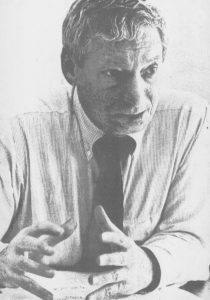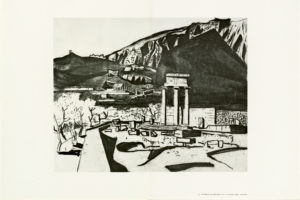
A recently completed Kickstarter campaign will fund the publication of a new edition of the “The Notebooks and Drawings of Louis I. Kahn,” a collection of the famed Philadelphia architect’s sketches.
Originally published in 1962, with a second edition printed in 1973, the collection has been out of print ever since.
Now, after raising more than $130,000 between Feb. 18 and April 2, Designers & Books, an independent publisher based in Brooklyn, will publish an exact facsimile of the original, alongside new material collected in a Reader’s Guide.

The Reader’s Guide will include a new essay from TED Conferences founder Richard Saul Wurman, Kahn’s one-time student, mentee and the original creator of the book; Kahn’s three children, including Nathaniel Kahn, who directed an Academy Award-nominated documentary about his father; Larry Korman, owner of the Kahn Korman House in Fort Washington; Jonathan Salk, son of Kahn’s friend Jonas Salk; the famed architect Moshe Safdie; and many more.
“When I came across it and actually had the chance to see it, I immediately knew that it was a book that I wanted us to publish,” said Steve Kroeter, editor in chief and founder of Designers & Books.
After Kroeter saw the book’s original version for the first time a few years ago, he reached out to Wurman with the idea to do a reprint. Wurman agreed on the condition that the reprint be accompanied by a detailed Reader’s Guide. Arrangements were made, the funds were raised and the two books are now available for preorder at louisikahn.com/shop.
Kahn, born Itze-Leib Schmuilowsky in 1901 on an island off the coast of Estonia, came to Philadelphia when he was 4. He displayed a knack for drawing from a young age — he was offered a full scholarship to the Pennsylvania Academy of the Fine Arts, according to the Kimbell Art Museum — but instead pursued architecture studying at the University of Pennsylvania after graduating from Central High School.
Over the course of a long career, Kahn, who was based in Philadelphia for much of his life, distinguished himself among architects as a singular thinker and builder, sought after across the world, according to Wurman. He designed everything from Philadelphia Housing Authority projects to the National Assembly Building in Dhaka, Bangladesh. He designed museums, homes, churches, schools and synagogues; Kahn built JCCs, research centers, factories and libraries.
He frequently took Philadelphia as his subject, even if his grander ideas for a redesigned, carless Center City (or Congregation Mikveh Israel) never came to fruition. He died in 1974, leaving behind a trove of drawings, writings, speeches and other papers collected today in the Louis I. Kahn Collection at the Architectural Archives of the University of Pennsylvania.
Wurman, a Philadelphia native who studied architecture at Penn, learned and worked under Kahn for years, and became a devotee of his work. When he was just 25, Wurman asked Kahn if he might allow Wurman to collect some of his sketches and texts into a book, a request that Kahn granted. Working with experimental printer Eugene Feldman, Wurman collected Kahn’s travel sketches from Greece, Egypt, Italy and France, alongside early drawings of his completed projects, like the Richards Medical Research Laboratories at Penn.
There are also renderings of Kahn’s ideas for Center City, never realized. Wurman interspersed the drawings with text — adaptations of Kahn’s speeches that he’d recorded and transcribed himself.
The book’s 2021 edition will be a reproduction of the 1973 second edition, produced by MIT Press, which added a letter from Kahn to Wurman and Feldman reflecting on the original.
“Lou Kahn was and is my mentor,” Wurman said.
Since Kahn’s death, Wurman has enjoyed success and multiple honors — a Guggenheim Fellowship, grants from the National Endowment for the Arts — and founded the TED conference in 1984. But Kahn’s work speaks to him through the decades, communicating ideas and a passion for craft.
“It changes your life, when you listen, and are one of those people who is interested in absorbing what he had to say, actually listening to what he had to say,” he said.
[email protected]; 215-832-0740



